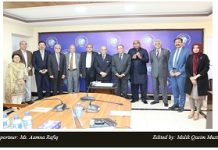Introduction
Following the withdrawal of US and NATO Forces, collapse of Ashraf Ghani’s Government and the Taliban coming into Power with the emergence of new terror elements such as ISIS-K and Al-Qaeda in Afghanistan. In fact, terrorism in Pakistan, which has been on a downward trend, is on the rise again, and according to the South Asia Terrorism Portal, by the end of September 2021, 67 terrorist attacks in Pakistan had killed 329 people, more than the total number of victims of terrorism in 2020, especially in August and September. There is a sharp increase in terrorism along the Afghan border. The geopolitical importance of Afghanistan has become central to the regional and international stakeholders’ debates on the future of intra-Afghan, regional and international peace and stability paradigms.
Concerns of current pertinence such as the deteriorating humanitarian and economic crises within Afghanistan which could lead to a visible influx of refugees and rise in terrorism incidents within the region and re-emergence of illicit narcotics outflows, harshening of border control policies by Afghanistan’s neighbours and the decentralized border management policies of the Taliban authorities, lack of inclusivity within the Taliban government and the violation of women and human rights present as some of the key challenges for peace-building.















